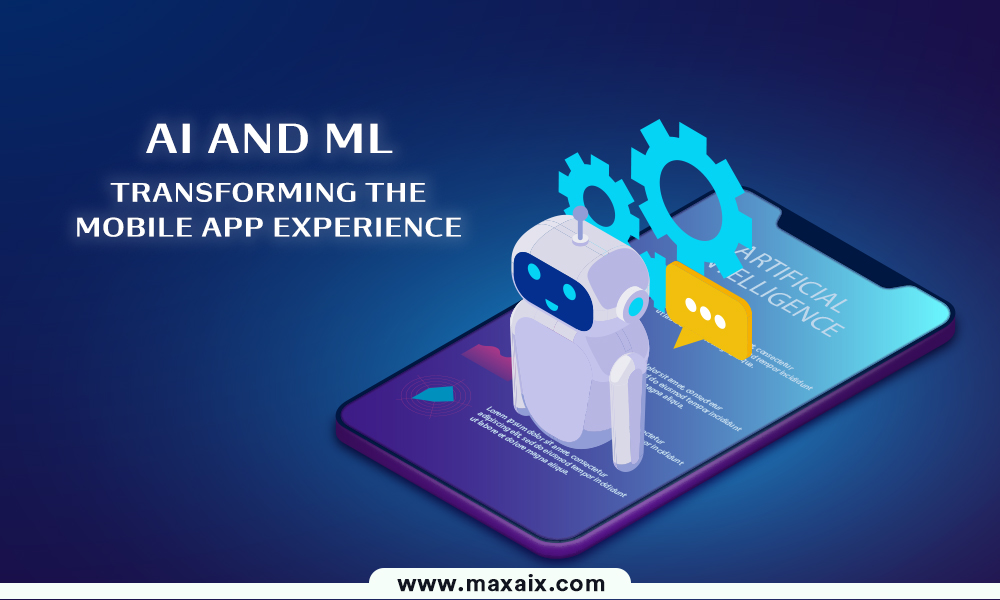AI and ML: The Game Changers in Mobile App Development

Artificial intelligence (AI) and machine learning (ML) are emerging as powerful tools that revolutionize the development, deployment, and use of mobile apps in the ever-changing field of app production. This comprehensive guide delves deeply into the intricacies of AI and ML in the development of mobile apps, clarifying their definitions, influences, benefits, real-world applications, integration methods, and Maxaix’s role in shaping the direction of AI-integrated mobile apps.
What is Artificial Intelligence?
Artificial intelligence (AI) is the process by which robots mimic the cognitive functions of humans. This is usually achieved by using data and algorithms. Furthermore, artificial intelligence (AI) enables robots to perform activities that often require human brains. For instance, understanding natural language, spotting patterns, and making decisions are some of these activities.
What is Machine Learning?
Within the realm of artificial intelligence (AI), a particular branch known as machine learning (ML) takes center stage. Primarily, ML focuses on the development of algorithms that empower computers to learn from and make predictions or judgments based on data. Interestingly, these machine learning algorithms aren’t explicitly coded in a traditional sense. Instead, they evolve over time, progressively improving their performance by learning from prior events. This continuous learning process is what sets machine learning apart and makes it a vital component of modern AI systems.
Mobile App Development: Artificial Intelligence (AI) and Machine Learning (ML) Explained
In mobile app development, artificial intelligence (AI) and machine learning (ML) play crucial roles in enhancing user experiences, streamlining operations, and enabling novel features. With the use of these technologies, programmers may create intelligent, customized, and context-sensitive apps that adapt to users’ shifting requirements and preferences.
The Impact of AI and ML on Mobile Application Development
The development of mobile apps is significantly and, in several ways, impacted by AI and ML:
- Augmented User Experiences: AI and ML enable smart automation features, voice recognition, predictive text input, and tailored recommendations that increase user pleasure.
- Performance Optimization: By anticipating and proactively addressing possible problems, machine learning algorithms may examine user behavior patterns, maximize resource usage, and improve application performance.
- Innovative Features: Mobile apps may now be more creative and functional thanks to AI-enabled features like facial recognition, augmented reality (AR), and natural language processing (NLP).
AI and ML in Mobile App Development: Benefits
There are several benefits of using AI and ML while developing mobile apps:
- Customization: AI and ML enable predicted insights based on user behavior and preferences, customized user experiences, and recommendations for relevant content.
- Efficiency: Machine learning techniques minimize development time and costs by automating repetitive operations, optimizing resource allocation, and streamlining processes.
- Precision: In mobile apps, AI-guided analytics and predictive models help to increase data precision, decision-making, and proactive problem-solving.
- Innovation: The creation of cutting-edge features and capabilities that distinguish applications in the cutthroat market, such voice assistants, picture recognition, and predictive text input, is made possible by AI and ML technologies.
The Role of AI in Mobile App Development
The following are some ways that AI has an important impact on mobile app development:
Increasing User Engagement: AI-powered chatbots, virtual assistants, and recommendation engines enthrall users with personalized experiences and engaging conversations.
Strengthen Decision-Making: AI analytics tools examine user data, market movements, and performance metrics to produce meaningful insights and direct strategic choices.
Automate Processes: AI techniques free up human resources for more important work by automating repetitive processes like data management, content aggregation, and customer support.
How AI and ML are Used in Enhancing Mobile Apps
ML and AI are used in many different contexts to enhance mobile apps:
Natural Language Processing (NLP): NLP enhances communication and usability by enabling voice recognition, sentiment analysis, and language conversion tools in mobile apps.
Computer Vision: Initially, computer vision techniques enhance the visual experiences of mobile apps. This is achieved by enabling capabilities such as object recognition. Furthermore, they also allow for augmented reality (AR). Lastly, these techniques facilitate picture identification, thereby enriching the overall user experience.
Predictive Analytics: Machine learning algorithms look at user behavior patterns and data to predict user preferences, provide relevant content recommendations, and anticipate future needs, all of which improve user engagement and personalization.
Intelligent Automation: In mobile app development processes like testing, deployment, and maintenance, AI-led automation streamlines workflows, increases productivity, and reduces mistakes.
Why is There a Need for AI and ML in Mobile App Development?
Several factors make AI and ML needed for mobile app development:
- User Anticipations: AI-enabled features and capabilities are becoming more necessary as users expect customized, intuitive, and intelligent experiences from mobile applications.
- Competitive Edge: Apps with AI integration may stand out in the market by offering cutting-edge features, better user interfaces, and enhanced performance.
- Data Complexity: We require advanced analytics and predictive modeling techniques to extract meaningful insights and value from the deluge of data from diverse sources, including social media, sensors, and IoT devices.
- Technological Progress: With the rapid pace of innovation, the integration of AI into mobile app development processes is becoming increasingly feasible. This is largely due to the significant advancements in ML and AI technologies. Furthermore, the availability of scalable computing resources and development tools has made this integration even more accessible. Consequently, this progress has opened up new possibilities for the development of more sophisticated and intelligent mobile applications.
Real-time Examples of AI and ML in Mobile App Development
Examples of real-world applications of AI and ML in mobile app development include:
Customized Suggestions: Apps like Spotify analyze user listening habits and propose songs and playlists based on machine learning algorithms.
Voice Assistants: Starting off, virtual assistants such as Siri and Google Assistant utilize natural language processing (NLP) and speech recognition technology to interpret user instructions, respond to inquiries, and perform tasks.
Image Recognition: Following this, apps like Pinterest and Google Photos implement computer vision algorithms to facilitate search and categorization features. These algorithms identify objects, sceneries, and text in photographs.
Predictive Text Input: Wrapping up, keyboard applications like Gboard and SwiftKey apply machine learning algorithms to boost typing speed and accuracy. These algorithms forecast and propose words and phrases as users type.
How Do You Integrate AI and ML into Mobile Applications?
Integrating AI and ML into mobile applications involves several steps:
- Use Case Identification: Identify the precise AI-driven features and functionalities—like customized recommendations, natural language processing, or predictive analytics—that complement the app’s objectives and user needs.
- Data Gathering and Preparation: Initially, to successfully train AI models, gather and preprocess relevant data. This data includes elements such as user interactions, feedback, and contextual information, which are crucial for the learning process.
- Model Creation: Subsequently, based on the identified use cases, create and train machine learning (ML) models. This involves using appropriate algorithms and methodologies, such as supervised learning, unsupervised learning, or reinforcement learning, thereby ensuring the models are well-equipped to handle the tasks at hand.
- Integration: To facilitate seamless interaction and functioning, integrate AI models and algorithms into the mobile app’s architecture via APIs, SDKs, or bespoke development frameworks.
- Testing and Refinement: Make that the AI-driven features are accurate, performant, and user-friendly by thoroughly testing them. Then, adjust the models in response to user comments and real-world use statistics.
How Maxaix Can Help in Building AI-Enabled Mobile Apps
Maxaix offers knowledge, options, and assistance for developing mobile apps with AI capabilities:
- AI Development Services: From conception to implementation, Maxaix matches its custom AI development services to the specific requirements and objectives of each mobile app project.
- Prebuilt AI Modules: To facilitate the creation and incorporation of AI-driven features and capabilities into mobile apps, Maxaix offers prebuilt AI modules, libraries, and frameworks.
- Consulting and Strategy: Businesses looking to integrate AI into mobile app development may benefit from Maxaix’s consulting and strategy services, which help define use cases, discover possibilities for AI integration, and create implementation roadmaps.
- Support & Maintenance: To guarantee the long-term success and efficacy of AI-enabled mobile apps, Maxaix provides continuous support, maintenance, and optimization services.
The Future of Mobile Applications Powered by AI and Machine Learning
The future of mobile applications powered by AI and machine learning is characterized by innovation, personalization, and intelligence:
- Advanced Personalization: AI-driven apps will offer increasingly personalized experiences tailored to individual preferences, behavior patterns, and contextual data.
- Intelligent Automation: AI-powered automation will streamline workflows, optimize resource usage, and enhance efficiency across all aspects of mobile app development, from design to deployment.
- Predictive Insights: ML models will provide predictive insights and recommendations in real time, enabling proactive decision-making and problem-solving for users and developers alike.
Frequently Asked Questions
What are AI and ML, and how do they impact mobile app development?
AI and ML are terms that primarily describe technologies. These technologies distinctively enable machines to perform activities that would typically require human intellect. For instance, they are notably capable of forecasting. Moreover, they excel in data-driven learning. Consequently, they are adept at job execution. Significantly, they have an impact on mobile app development by allowing cutting-edge features, effectively streamlining user experiences, and dramatically enhancing performance.
What are the benefits of integrating AI and ML into mobile applications?
Benefits include improved decision-making, streamlined performance, improved user experiences, and innovation, all of which raise user engagement, efficiency, and competitiveness in the market.
What are some real-world examples of AI and ML in mobile app development?
Examples include voice assistants, picture recognition, predictive text entry, tailored recommendations, and augmented reality capabilities seen in applications like SwiftKey, Siri, Spotify, and Pinterest.
How can AI and ML be integrated into mobile applications?
The process of incorporation includes use case identification, data collection and preparation, machine learning model creation and training, model integration with app architecture, testing, and optimization.
How can Maxaix help in building AI-enabled mobile apps?
Including custom development services, ready-made AI modules, strategy, consultancy, and ongoing support and maintenance, Maxaix offers knowledge, solutions, and assistance for the development of AI-enabled mobile apps.


